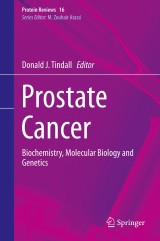Details

Prostate Cancer
Biochemistry, Molecular Biology and GeneticsProtein Reviews, Band 16
|
213,99 € |
|
| Verlag: | Springer |
| Format: | |
| Veröffentl.: | 09.05.2013 |
| ISBN/EAN: | 9781461468288 |
| Sprache: | englisch |
| Anzahl Seiten: | 522 |
Dieses eBook enthält ein Wasserzeichen.
Beschreibungen
<i>Prostate Cancer</i> provides an up-to-date review of the biochemistry, molecular biology, and genetic changes in prostate cells that are the driving forces in the initiation and progression of cancer. It includes an overview by experts in the field of cell-cell interactions, including stem cells, reactive Stromal cells and membrane lipid rafts that are instrumental in the initiation and progression of prostate cancer.
Preface.- Section 1: Cell Biology.- Stem Cells in the Normal and Malignant Prostate.- Role of Reactive Stroma in Prostate Cancer.- The Role of Cholesterol in Prostate Cancer.- Section 2: Genetics: PTEN in Prostate Cancer.- ETS fusion genes in prostate cancer.- Section 3: Cell Signaling.- Signaling Mechanisms of Vav3, a Guanine Nucleotide Exchange Factor and Androgen Receptor Coactivator, in Physiology and Prostate Cancer Progression.- Transforming Growth Factor-beta (TGF-b) in Prostate Cancer.- The p38 MAPK Pathway in Prostate Cancer.- NF-kappaB2/p52 in Prostate Cancer.- The functional role of DAB2IP, a homeostatic factor, in prostate cancer.- Tyrosine Kinases in Prostate Cancer.- Human prostatic acid phosphatase in prostate carcinogenesis.- Section 4: Hormonal.- Truncated Androgen Receptor Splice Variants in Prostate Cancer.- Biology and Clinical Relevance of Estrogen Receptors in Prostate Cancer.- Vitamin D and Prostate Cancer.- HDAC6 regulation of androgen signaling in prostate cancer.- Beyond the cell cycle: Implications of D-type cyclin deregulation in Pca.- Section 5: Cell Death.- Role of Par- in Prostate Cancer.- Autophagy and Prostate Cancer Therapeutics.- Index.
Prostate cancer is the most frequently diagnosed non-cutaneous malignancy in men, and the second leading cause of male cancer-related mortality in the United States. The last decade has seen unprecedented progress in the detection, prognosis, treatment and prevention of prostate cancer. These advances have been driven largely by an increased understanding of the underlying biochemistry, molecular biology and genetics of the disease. New cell and animal models have been developed that recapitulate the natural progression of prostate cancer. New technologies have allowed scientists to view in detail the genomic, proteomic, metabolomics and other –omic universe of cancer cells and tissues. This has resulted in a greater understanding of the pathophysiology of the disease.
Gives the reader a comprehensive conceptual framework of the cellular mechanism that are critical for the initiation and progression of prostate cancer Geared toward basic scientists, instead of largely clinically oriented Includes an overview by experts in the field of cell-cell interactions, including stem cells, reactive Stromal cells, and membrane lipid rafts that are instrumental in the initiation and progression of prostate cancer

















